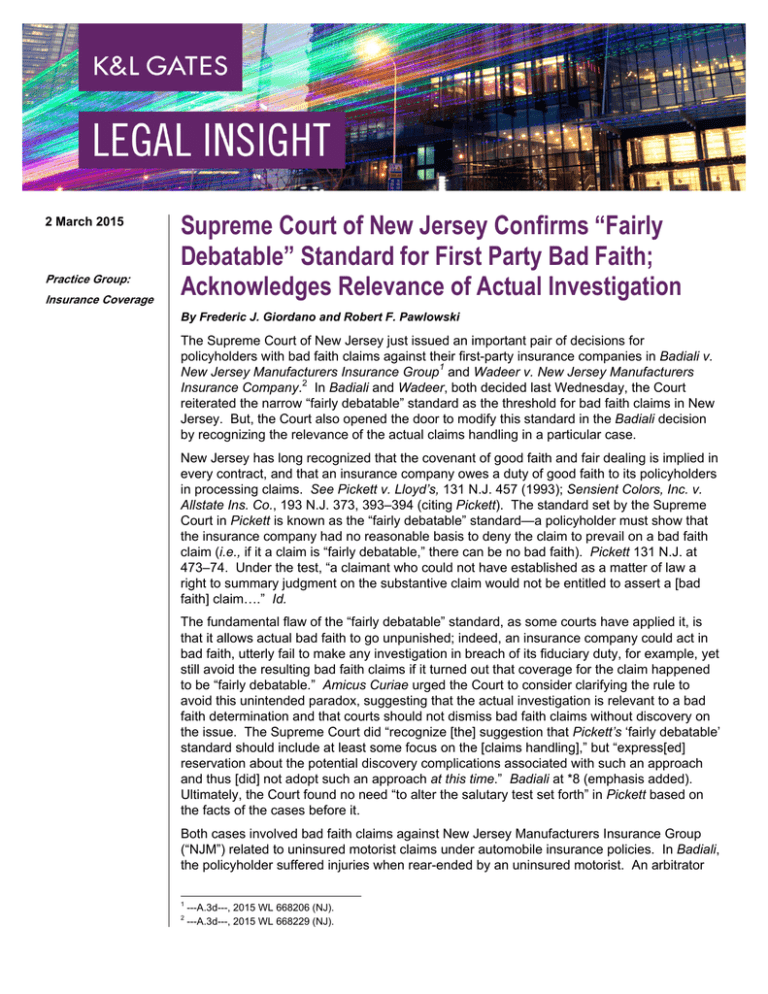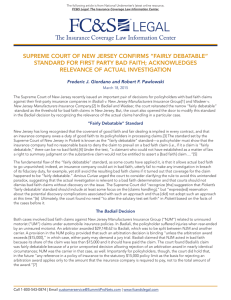
2 March 2015
Practice Group:
Insurance Coverage
Supreme Court of New Jersey Confirms “Fairly
Debatable” Standard for First Party Bad Faith;
Acknowledges Relevance of Actual Investigation
By Frederic J. Giordano and Robert F. Pawlowski
The Supreme Court of New Jersey just issued an important pair of decisions for
policyholders with bad faith claims against their first-party insurance companies in Badiali v.
New Jersey Manufacturers Insurance Group1 and Wadeer v. New Jersey Manufacturers
Insurance Company.2 In Badiali and Wadeer, both decided last Wednesday, the Court
reiterated the narrow “fairly debatable” standard as the threshold for bad faith claims in New
Jersey. But, the Court also opened the door to modify this standard in the Badiali decision
by recognizing the relevance of the actual claims handling in a particular case.
New Jersey has long recognized that the covenant of good faith and fair dealing is implied in
every contract, and that an insurance company owes a duty of good faith to its policyholders
in processing claims. See Pickett v. Lloyd’s, 131 N.J. 457 (1993); Sensient Colors, Inc. v.
Allstate Ins. Co., 193 N.J. 373, 393–394 (citing Pickett). The standard set by the Supreme
Court in Pickett is known as the “fairly debatable” standard—a policyholder must show that
the insurance company had no reasonable basis to deny the claim to prevail on a bad faith
claim (i.e., if it a claim is “fairly debatable,” there can be no bad faith). Pickett 131 N.J. at
473–74. Under the test, “a claimant who could not have established as a matter of law a
right to summary judgment on the substantive claim would not be entitled to assert a [bad
faith] claim….” Id.
The fundamental flaw of the “fairly debatable” standard, as some courts have applied it, is
that it allows actual bad faith to go unpunished; indeed, an insurance company could act in
bad faith, utterly fail to make any investigation in breach of its fiduciary duty, for example, yet
still avoid the resulting bad faith claims if it turned out that coverage for the claim happened
to be “fairly debatable.” Amicus Curiae urged the Court to consider clarifying the rule to
avoid this unintended paradox, suggesting that the actual investigation is relevant to a bad
faith determination and that courts should not dismiss bad faith claims without discovery on
the issue. The Supreme Court did “recognize [the] suggestion that Pickett’s ‘fairly debatable’
standard should include at least some focus on the [claims handling],” but “express[ed]
reservation about the potential discovery complications associated with such an approach
and thus [did] not adopt such an approach at this time.” Badiali at *8 (emphasis added).
Ultimately, the Court found no need “to alter the salutary test set forth” in Pickett based on
the facts of the cases before it.
Both cases involved bad faith claims against New Jersey Manufacturers Insurance Group
(“NJM”) related to uninsured motorist claims under automobile insurance policies. In Badiali,
the policyholder suffered injuries when rear-ended by an uninsured motorist. An arbitrator
1
2
---A.3d---, 2015 WL 668206 (NJ).
---A.3d---, 2015 WL 668229 (NJ).
Supreme Court of New Jersey Confirms “Fairly Debatable” Standard for First
Party Bad Faith; Acknowledges Relevance of Actual Investigation
awarded $29,148.62 to Badiali, which was to be split between NJM and another carrier. A
provision in the NJM policy provided that such an arbitration decision is binding “unless the
arbitration award exceeds [$15,000],” in which case, either party may demand a jury trial.
Badiali claimed that NJM acted in bad faith because its share of the claim was less than
$15,000 and it should have paid the claim. The Court found Badiali’s claim was fairly
debatable because of a prior unreported decision allowing rejection of an arbitration award in
nearly identical circumstances; NJM was the carrier in that case, as well. Importantly for
policyholders, though, the Court did hold that, in the future “any reference in a policy of
insurance to the statutory $15,000 policy limit as the basis for rejecting an arbitration award
applies only to the amount that the insurance company is required to pay, not to the total
amount of the award.” Badiali at *11.
In Wadeer, the NJM rejected several arbitration awards in favor of its policyholder, two within
policy limits, one in excess of the $100,000 policy limits. At trial, a jury awarded the
policyholder over $250,000, but molded the verdict to policy limits. Previously, the
policyholder made a $95,000 offer of judgment under Rule 4:58-2, which provides attorneys’
fees to an offering party where the award exceeds 120% of the offer. The Court refused to
uphold the lower court’s award of attorneys’ fees under this rule because, after molding the
verdict, the award was below 120% of the offer of judgment. The Court also rejected
Wadeer’s bad faith claims on res judicata grounds; NJM argued that the entire controversy
doctrine barred the claim, as well. In considering the entire controversy doctrine, the Court
observed that “[a]cts of first-party bad faith in the UM context can, and often will, continue
throughout the course of the underlying legal proceedings” and “an insurance carrier’s acts
of bad faith may often not cease until a verdict is returned, and this is only after the plaintiff
has been forced to fully litigate the matter through arbitration and trial.” Wadeer at *10. The
Court, thus, iterated its belief that “viewing bad faith claims as separate and distinct actions
promotes judicial efficiency and economy.” Id.
The Supreme Court in Wadeer recommended that the Civil Practice Committee consider
several issues that would inure to the benefit of policyholders, if adopted: (1) whether to
allow policyholders to first assert party bad faith claims after resolution of an underlying
uninsured motorist action under the entire controversy doctrine; (2) whether the trigger for
the offer of judgment rule in the uninsured/underinsured motorist context should be an actual
damages verdict instead a molded verdict entered by the court; and (3) whether to expand
Rule 4:42-9(a)(6)’s allowance for counsel fees “in an action upon a liability of indemnity
policy of insurance, in favor of a successful claimant” to first-party insurance claims. New
Jersey policyholders should keep an eye on the Committee for any changes to these rules
that would bolster a policyholder’s ability to recover against its insurance company.
Authors:
Frederic J. Giordano
frederic.giordano@klgates.com
+1.973.848.4035
Robert F. Pawlowski
robert.pawlowski@klgates.com
+1.973.848.4032
2
Supreme Court of New Jersey Confirms “Fairly Debatable” Standard for First
Party Bad Faith; Acknowledges Relevance of Actual Investigation
Anchorage Austin Beijing Berlin Boston Brisbane Brussels Charleston Charlotte Chicago Dallas Doha Dubai Fort Worth Frankfurt
Harrisburg Hong Kong Houston London Los Angeles Melbourne Miami Milan Moscow Newark New York Orange County Palo Alto Paris
Perth Pittsburgh Portland Raleigh Research Triangle Park San Francisco São Paulo Seattle Seoul Shanghai Singapore Spokane
Sydney Taipei Tokyo Warsaw Washington, D.C. Wilmington
K&L Gates comprises more than 2,000 lawyers globally who practice in fully integrated offices located on five
continents. The firm represents leading multinational corporations, growth and middle-market companies, capital
markets participants and entrepreneurs in every major industry group as well as public sector entities, educational
institutions, philanthropic organizations and individuals. For more information about K&L Gates or its locations,
practices and registrations, visit www.klgates.com.
This publication is for informational purposes and does not contain or convey legal advice. The information herein should not be used or relied upon in
regard to any particular facts or circumstances without first consulting a lawyer.
© 2015 K&L Gates LLP. All Rights Reserved.
3




